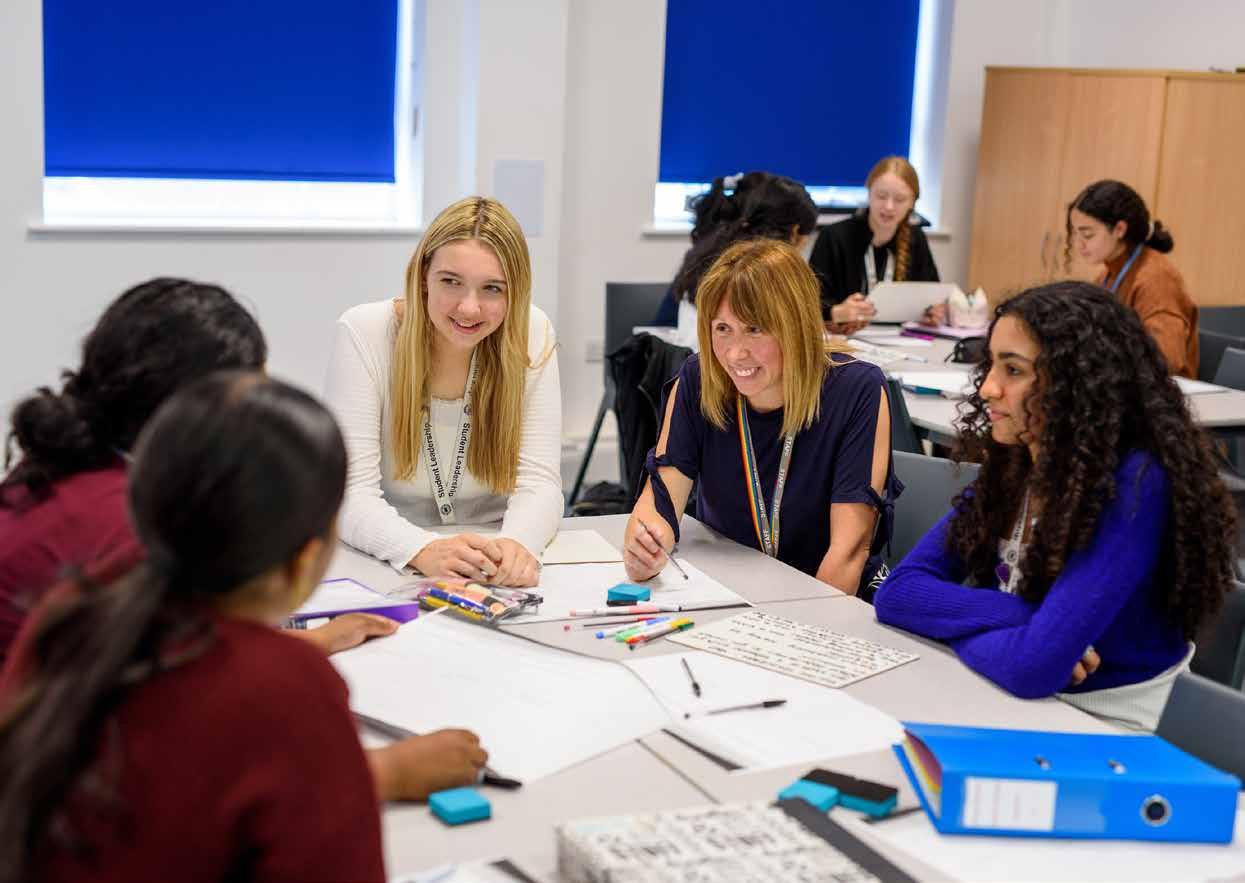




Art is everywhere. We live in a predominantly and ever-increasing visual society where visual communication and understanding is vital. Employers increasingly seek those who can exercise initiative, adaptability, independent judgement and creative problem solving which are the attributes that art and design students have in abundance. The UK produces extremely talented artists and designers who work in world-leading industries. The study of Art & Design will develop your creativity, visual learning, motor skills, decision making, perseverance, focus, collaboration, accountability, improve confidence and has been scientifically proven to improve academic performance. It’s not just drawing and painting!
We follow the AQA Fine Art endorsement (full linear course). Two components of work are created over the two year course; the Personal Investigation and Portfolio (September in Year 12 to January in Year 13) and the Externally Set Assignment in Year 13 (February to May) culminating in a 15 hour practical exam. We work in a self-directed route, engaging in personal lines of visual enquiry and developing individual technical skills to expand your creativity and imagination and develop a personal style. You will explore the use of drawing for different purposes, using a variety of methods and media on a variety of scales. You will use sketchbooks/journals to underpin your work where appropriate to accompany each component and you will be aware of the importance of process as well as product.
You will develop an understanding and appreciation of aspects of the history of Art and Design and this should lead, inspire and enhance your own work. You will explore relevant images, artefacts and resources relating to a range of art, craft and design, from the past and from recent times.
With the removal of exams at the end of Year 12, this will give us more time for practical studio work and critical and contextual research, gallery visits and workshops to explore a range of materials and processes.
Students usually progress to degree courses in Art & Design through application to a Foundation course. This in turn gives students a broader understanding of the wide variety of specialisms available at degree level. The choice of further study is extraordinary with new courses emerging yearon-year with the advance of creative technologies. Career paths include: creative technologies, fashion, interior design, web and digital design, textile design and manufacture, graphic communication, animation, conservation and restoration, history of art, curation and education, film and television, product design, photography, 3D design, advertising, marketing, journalism, set design, stylist, special effects, industrial design…the list goes on!
- Tom
“I loved Fine Art at GCSE and wanted to learn about it in more depth. It’s a welcome break from essay-based subjects; the diversity is non-repetitive, with a variety of ways of working, it’s not prescribed or limited. I also knew I wanted a creative career, so doing an Art & Design A-level was essential. My other subjects are Drama and English.”
“I love being able to direct my own learning. Mistakes are actively encouraged to promote creativity (no right or wrong answers), even accidents are good! Everyone develops their own style so the atmosphere is supportive rather than competitive.”
“I would like a creative career in Film; something in the production side where I can use my visual skills. I will probably complete a diagnostic foundation course in Art & Design to build a portfolio to then enable me to choose my specialism for my degree.”
Biology is a vast and varied subject which includes the study of living things from minuscule micro-organisms right the way up to human beings and beyond. The course aims to develop your interest and enthusiasm for Biology and hopefully inspire you to further study or careers in Biology. In addition we want to develop your understanding of how different areas of Biology relate to each other and help you to apply this understanding to unfamiliar situations. It encourages students to appreciate how society makes decisions about scientific issues and how Biology contributes to the success of society and the economy.
In the course you will develop and demonstrate a deeper appreciation of the skills, knowledge and understanding of How Science Works.
We follow the OCR Biology fully linear course, with assessment being on a terminal exam at the end of two years. We study the following topics:
• Development of practical skills
• Foundations in Biology
• Exchange and Transport
• Biodiversity, evolution and disease
• Communication, homeostasis and energy
• Genetics, evolution and ecosystems
We run a fieldtrip to Camber Sands during year 12, which provides an excellent opportunity to develop fieldwork skills and ensures students are able to meet the required practical skills which are difficult to gain in a laboratory environment.
All A level students are encouraged to participate in the Biology Olympiad and we run a support club to help all students with any questions they have or clarifications that are needed.
There are many options available for further study at university. These include medicine, dentistry, veterinary science, biochemistry, biological sciences, microbiology, psychology, nursing, pharmacology, physiotherapy, environmental science amongst many more options.
“I chose Biology because I thoroughly enjoyed it at GCSE and knew that I wanted to pursue a Biology- related career. I also love learning about animals and plants - especially genetics.”

What I like best about the course...
“I love learning about the processes and mechanisms of the world around me. It was really interesting to learn about how diseases such as COVID-19 are able to spread and affect the body. I also loved learning about genetics in much further detail compared to GCSE, which answered questions that I had remaining after GCSE.”
Where I hope it will take me…
“I am hoping to do a Biology degree at University where I hope to focus on epidemiology and go on to a career in this area.”
Completing an A level in chemistry can open so many doors for you in the future. It is a challenging, academic and rigorous A level that will impress a lot of universities and future employers. Studying A level chemistry can lead to many careers in healthcare such as medicine, pharmacy and dentistry but is also extremely useful in careers in the biological sciences, veterinary science, physics, mathematics, pharmacology and analytical chemistry. Did you know that chemists are also involved in many other areas, such as Law, Art Restoration, Forensic Science, Sport & Fitness Training, Conservation, Photography and the formulation of cosmetics and perfumes?
We follow the OCR Chemistry A fully linear course, with assessment being on terminal exams at the end of two years. We study the following topics:
• Development of practical skills
• Foundations in Chemistry
• Periodic Table and energy
• Core Organic Chemistry
• Physical chemistry and transition elements
• Organic chemistry and analysis
With the removal of exams at the end of Year 12, this will give us time to consolidate material on to University level and provide opportunities to make exceptional progress. All A level students are encouraged to participate in both the Chemistry Olympiad and the Cambridge Chemistry Challenge. We run a ‘Stretch and Challenge’ Club for students to pursue their studies to the highest level.
The choice of further study is vast, e.g. medicine, dentistry, veterinary science, biochemistry, pharmacology, biological sciences, microbiology, psychology, nursing, physiotherapy, speech therapy, forensic science and many more. Chemistry degrees are well respected for general graduate careers and PhD studies.
“I chose chemistry as it was one of my favourite subjects during GCSEs. As my other A-levels subjects (Maths, Physics and Computer Science) are also STEM based there is a lot of overlap, and taking chemistry alongside them gave me many opportunities to consolidate my knowledge, and learn more around the subject.”
“I really enjoy organic chemistry, as it is very interesting to learn mechanisms for reactions such as making alcohols. The lessons are really great, as you can work at your own pace, and there are many resources to support you when you are not as certain.”
“I am applying for Computer Science at university, and chemistry has a lot of problem solving and calculations, which are crucial for a career in computing.”

Advances in computing are continually transforming the way we learn, work and live. A-level Computer Science is relevant, valuable and interesting. The course focuses on the knowledge, skills and understanding that students need to progress to higher education or to thrive in an IT environment. One can study Computing and go on to a career in medicine, law, business, politics or any type of engineering or science. A-level Computer Science features as a useful A-level subject in the Russell Group’s ‘Informed Choices’, for many scientific and engineering degrees.
We follow the OCR Computer Science fully linear course, with assessment being at the end of two years made up of two exams and a project.
You will cover two main areas of computing:
Computer systems – looking at characteristics of contemporary processors, input, output and storage devices; software and software development; exchanging data between systems; data types, data structures and algorithms and consider legal, moral, cultural and ethical issues.
Programming – looking at elements of computational thinking, problem solving, programming constructs, standard algorithms and how to use algorithms to solve problems. While we will learn using C#, the exams do not require the use of any particular programming language, focussing on the understanding of principles instead.
The final project will enable you to develop your interests in the world of Computer Science in any direction you like, while having the opportunity to apply the skills learnt in class and go beyond the curriculum to enhance your skills and understanding. This can be completed using any programming language allowing you to develop and hone skills in most mainstream languages.
Computing / Computer Science is about designing and using computer-based algorithms to solve problems. This involves computer programming: we develop programming skills in C#. But the course is not just training in a programming language. The emphasis is on computational thinking. This requires abstraction and decomposition. The study of computation is about what can be computed and how to compute it. Computer Science involves questions that have the potential to change how we view the world.
Computer Science can open most doors. The skills you learn demonstrate your ability to think analytically, critically and logically. Careers reach from research and development into new technologies, to data efficiency and environmental improvements. At management level, having the ability to mediate between clients and technical teams is highly desirable.
“I was not able to study Computer Science for GCSE as I took BTEC IT. I had a look at the specification for A-level Computer Science and was immediately excited by all the things I would learn. Furthermore, it is a very relevant subject now as a lot of professions require some form of programming and Computer Science theory.”
As Shakespeare so eloquently writes, ‘All the world is a stage, and all the men and women merely players.’ Drama and Theatre Studies is an exciting, practical and academic course that allows you to get the key communication skills needed to succeed in life. Through exploration of playwrights, practitioners and genres pupils will work as a production company to produce interesting and innovative interpretations of key plays.
We follow the AQA Drama fully linear course, with assessment being broken into 3 components:
Component 1: Interpreting Drama: Written Exam:
• 2 set texts which will be practically explored. One text will be pre 20th century and the second text will be post 20th century. The set text questions are open book.
• A production explored practically and seen live.
Component 2: Creating Original Drama:
• This a devised unit of work in which a completely original piece of theatre is created. This is influenced by one theatre practitioner.
• A working notebook will be kept and assessed.
Component 3: Making Theatre:
• A practical exploration of 3 chosen plays. The third extract will be performed to an external examiner.
You will develop:
• The practical skills of voice and body language
• Understanding of key theory
• Analytical and evaluation skills

• Performance and rehearsal techniques
• Production elements
The choice of further study is vast, e.g. medicine, law, teaching, stage craft, production, acting, costume design, sound production – the list is endless.
“I chose Drama A-Level not only because I loved it during GCSE, but also because of my sheer passion for acting and creating theatre. Drama is an inclusive and safe space where I can freely express myself. We are given much more creative freedom to bring our visions to life, which is a nice balance with my other subjects, History and Maths. Personally, I find this to be a perfect combination as I can develop a variety of skills through each different subject (STEM, Humanities and the Arts). The Drama department are also super friendly and welcoming, which makes the course even more appealing!”
What I like best about the course...
“Drama A-level is a step up from GCSE, where us students are granted more creative liberty when devising theatre. I also love the aspect of independence as well as teamwork. You will build a special bond with your classmates and teachers, which makes the subject all the more worthwhile. There is also a great balance of practical and written work where we explore different plays, creating our own staging ideas. The teachers are extremely supportive and compassionate, helping prepare you to ace the A-Level to the best of your abilities.”
“Drama has been an extremely beneficial subject for gaining skills applicable to any degree. I’m aiming to pursue Law and Politics at university and Drama has helped me to curate and express broad ideas whilst enhancing my analytical and communication skills, all applicable to this degree.”
This creative and thought-provoking qualification gives students the practical skills, theoretical knowledge and confidence to succeed in a number of careers. Especially those in the engineering and creative industries. They will investigate historical, social, cultural, environmental and economic influences on design and technology, whilst enjoying opportunities to put their learning in to practice by producing prototypes of their choice. Students will gain a real understanding of what it means to be a designer, alongside the knowledge and skills sought by higher education and employers.
We follow the AQA Design and Technology: Product Design full linear course. Areas that will be studied include:
• Technical principles
• Designing and making principles
• Practical application of technical principles, designing and making principles.
Students are encouraged to be open to taking risks, showing innovation and enterprise whilst considering their role as responsible designers and citizens.
The choice of further study is vast. You could study a BA, BEng or BSc in areas like engineering, architecture, designing and manufacturing, STEM, as well as careers in the creative industries.
Design and Technology compliments other A Level subjects including Maths, Physics, Chemistry, Computer Science and Art.
Design and Technology is a great subject to study for jobs that require problem solving and practical skills and demand for people in these work areas is growing.
Any career in the creative or scientific industries including;
• Design
• Architecture
• Engineering
• Business


“My favourite part of Product Design is definitely the NEA because it gives me the opportunity to be creative and think differently to come up with innovative solutions to problems I face. I also enjoy the theory aspect of the subject and learning how different products are made”
What I like best about the course...
“I chose product design as it is a subject with a lot of variety and challenge. It has a lot of real-life application and it is also a very practical subject.”
“I like the range of skills we learn throughout the course (modelling, hand skills and CAD/CAM etc.) and the application of design techniques to real life. Increasingly I find myself encountering a problem and thinking ‘how can I solve this?
Where I hope it will take me…
“I am hoping to pursue a career in architecture and Product Design has helped me to develop my modelling and iteration skills. CAD will also be useful in my chosen career.”

Economics is about choice and the impact of our choices on each other. It relates to every aspect of our lives, from the decisions we make as individuals or families to the structures created by governments and firms. The economic way of thinking can help us make better choices.
We follow the Edexcel Economics linear course, with assessment being on a terminal exam at the end of two years. We study the following topics:
• Economic methodology and the economic problem
• Individual economic decision making
• Price determination in a competitive market
• Production, costs and revenue
• Perfect competition, imperfectly competitive markets and monopoly
• The labour market
• The distribution of income and wealth: poverty and inequality
• The market mechanism, market failure and government intervention in markets
• The measurement of macroeconomic performance
• How the macro-economy works: the circular flow of income, AD/AS analysis, and related concepts
• Economic performance
• Financial markets and monetary policy
• Fiscal policy and supply-side policies
• The international economy
The majority of students gain access to university normally taking an Economics or Business related degree. A number have gone into careers in commerce, banking and financial service industries and working for the Government.

“Read any newspaper and you will have no shortage of economic issues and questions, that’s why I wanted to study Economics.”
What I like best about the course…
“Economics is the only social science awarded the Nobel Prize. Economics is a rich intellectual tradition, and the economic way of thinking gives you a distinct voice in the choices faced by society.”
Where I hope it will take me…
“As well as Economics I study Chemistry, Mathematics and Further Mathematics. At university I want to read Finance.”
English Literature is a gift for the rest of your life. The texts you study and characters you meet stay with you, even change you. Like GCSE, it invites you into the mind of the writer by discussing and interpreting why words or phrases are used and developed and how texts are shaped by their contexts. Unlike GCSE, the focus is more on argument and interpretation and so almost all exams are open book. An A Level in English Literature sharpens your skills to construct and develop precise and persuasive arguments within a well-built and cogent essay and within your life.
We follow the AQA English Literature Specification
A fully linear course, with there being a terminal exam at the end of two years. The following units will be completed:
• Section A – Shakespeare: one passage-based question with linked essay
• Section B – Unseen poetry: compulsory essay comparing two unseen poems
• Section C – Comparing texts: one question linking two set texts (one of which must be pre-1900) – clean copies of texts can be taken into the examination
Paper Two – Texts in Shared Times Option 2B Modern Times: Literature from 1945 to Present Day
• Section A – Set text: one essay question on set text
• Section B – Contextual linking: one question on unseen extract, one question linking the remaining set texts
Non-Exam Assessment – Independent Critical Study: Texts Across Time
• Coursework essay of 2500 words comparing two texts of your choice (one must be pre-1900)
The study of English Literature at A Level will equip you with a wide range of skills that can be applied to all disciplines and occupations later on. It is very highly regarded by universities and employers because of the rigour and complexity of the skills and knowledge that the subject demands. It is an excellent foundation subject for a variety of degrees including Law, History, History of Art, Philosophy and Theatre Studies. English is a particularly popular degree for those intending to work in publishing, journalism, television, advertising or teaching, or those who intend to take a Law conversion course after their first degree. Effectively, it is an excellent preparation for the high level communication skills that all school leavers need to succeed in the 21st century.

“I wanted to develop my ability to articulate my thoughts, nurture new critical ideas and sharpen my analytical skills. I saw A Level English as an opportunity to see the world from a huge range of perspectives.”
What I like best about the course...
“I’ve really enjoyed the class discussion – something I’ve developed even more in LitSoc and Book Club. Taking English A Level has opened up so much more to me within the world of literature – like when we went on the Y12 poetry trip to London.”
Where I hope it will take me…
“I hope to study Law, but there are so many different places English Literature can take you. The evaluative and analytical skills you gain are useful in any degree and just in day to day life. I also think it makes you a more attentive and empathetic person as you learn to consider multiple perspectives.”
By studying A-level French you will develop a lasting appreciation of the French language, the ability to comprehend the language in a wide range of contexts, the ability to communicate readily in French for a variety of purposes, useful knowledge of and insights into the culture of France and the Frenchspeaking world and valuable skills for foreign travel, further education and employment.
Over 220 million people around the world speak French. French is the official language in 29 countries which puts it in second place behind English.
We follow the Pearson French course, with assessment being on a terminal exam at the end of two years. We study the following topics:
• The evolution of French society
• Culture in the French-speaking world
• Immigration and the French multicultural society
• The National Front
• The second world war
• Film: les choristes
• Text: un sac de billes
All A level students are encouraged to take part in our year 12 trip which is an exchange and work experience in Belgium. In addition to normal lessons, you will also have the chance to have individual lessons with our French assistant.
The course will give you a good foundation for further study in higher education. French is in demand in a wide variety of professions including banking, international trade and commerce, import and export, tourism, foreign office, diplomatic corps, teaching, translating, interpreting and many more.

“I enjoy learning different grammatical structures and how to improve my fluency and proficiency at the language. The culture aspects that we look more at in A level really interest me.”
What I like best about the course...
“I like the debates we have and being able to analyse a film and book really helps in understanding the language better in terms of grammar structures, vocabulary and culture through history.”
Where I hope it will take me…
“Studying French gives me more confidence to communicate with others and challenge other people on their opinions. I hope to study in France during university (English and French law) so that I can learn more of the language and the beauty of the culture.”
Geography is a dynamic and highly relevant subject. Geography is appearing daily on our news screens, with links to the impacts of climate change, how we should reduce our carbon emissions, how to best tackle plastic pollution, managing migration, dealing with global pandemics, how to manage and response to natural disasters, seemingly increasing extreme weather events, sustainability, trade and the economy, geopolitics and geopolitical relationships - learning about Geography has never been more important!
AQA Geography is a fully linear course, with 2 exam papers sat at the end of Year 13. We study the following topics:
Paper 1: Physical: (40%)
• Water and Carbon Cycle
• Coastal Systems and Landscapes
• Hazards
Paper 2: Human: (40%)
• Contemporary Urban Environments
• Changing Places
• Global Systems and Global Governance
NEA- Non-Examined Assessment (20%)
• Students complete an individual independent fieldwork investigation based on a question or issue relating to any part of the specification content that they are interested in.
• They must collect primary as part of this investigation, so students have to complete 4 days of fieldwork as part of the course.
Students have gone to study Geography at a range of universities- Oxford, Cambridge, Durham and Southampton to name a few, with courses focusing just on human Geography (BA) or physical Geography (BSc) as well environmental science, oceanography, international development and geopolitics.
Geography graduates can progress on to a wide range of careers, including finance, commerce and business, local and national government, international relations and development, urban planning, teaching, meteorology, conservation, flooding, renewable energy and journalism!
“Studying Geography A-level seemed inevitable to me as it is the basis for everything in the worldenvironments, economies, cultures, political systems and conflicts, etc.
As climate change worsens, Geography plays a more significant role in our lives, and studying this subject will provide you with the tools and understanding to help combat climate change - on an individual level or as part of your future career.”
“I chose A-level Geography because the subject is so vast! We cover so many topics that include science related topics and political topics. I love being part of various conversations and knowing that I can contribute to them with my own analysis.”
“I chose A Level Geography because I enjoyed it at GCSE and I wanted to get a deeper understanding of how certain things occur.
Taking Geography A Level alongside Economics is intriguing for me because of the common ground they share, I believe it helps me gain a better understanding of topics as I get to see things from both a geographical and an economical perspective.”
By studying A-level German you will develop a lasting appreciation of the German language, the ability to understand and communicate in German and useful knowledge of and insights into the culture of Germany and the German-speaking world.
Germany today is the political, economic, artistic and intellectual powerhouse of Europe and the European Union. Knowledge of the mother tongue of over 100 million people, (German has the largest number of native speakers in the European Union, more than English, Spanish or French) has never been more important for governments, businesses and private citizens, and students of German are therefore consistently amongst the most sought-after graduates for major employers.
We follow the Pearson German course, with assessment being on a terminal exam at the end of two years. We study the following topics:
• The evolution of German society
• Culture in the German-speaking world
• Immigration and the German multi-cultural society
• East-German society pre-unification
• The Reunification of Germany
• Text: Das Leben der Anderen
• Film: Andorra by Max Frisch
All A level students are encouraged to take part in our year 12 work experience trip, usually to Koblenz. In addition to normal lessons, you will also have individual lessons with our German assistant.
The course will give you a good foundation for further study in higher education. German is recognised by universities as a facilitating subject and is in demand in a wide variety of professions including banking, import and export, foreign office, diplomatic corps, international trade and commerce, law, tourism, teaching, translating, interpreting and many more.
”I chose to study German to develop my skills already learnt at GCSE and gain an insight into life in Germany as well as its history and culture. I also wanted to see how languages and learning a language influence people.”

“I love that the course relates to current issues and covers a broad range of topics, ranging from Germany’s history to current affairs like the impact of Covid-19 on the country. I am improving my language abilities at the same time. Studying German film and literature also provides a comprehensive insight into German life.”
“I intend to study Psychology or Language Sciences at University and am hopeful that my new outlook through learning a language will equip me with a more objective perspective of people, and that I will have gained invaluable communication and comprehension skills.”
The world is in a state of turmoil. Megalomaniacs and egotistic have seized power and are set about dismantling everything we have always thought sacred. Young women of Nonsuch, it’s time to take back control, it’s time to make politics great again!
Study politics, find out about the systems and the people that govern us, evaluate the ideologies available and then determine to set the future course of British political history yourself.
In Year 12 you will study British Politics, examining the systems of government, the people in power, and the nature of democracy that exists here.
In Year 13 you will focus on American Politics and examine the controversies and debates that surround their political system.
Over both years you will study the major political ideologies that exist, conservatism, liberalism and socialism as well as a specific focus on feminism.
Politics doesn’t close doors, nor does it mean you are destined for a career as a politician. Employers respect the academic nature of politics as an A level or degree level subject as it identifies strong minded, culturally aware and analytically minded individuals. Russell Group universities want more than just grades. They want to find students who are aware of the world, who have opinions and can discuss the matters of the day and nothing will better prepare you for an interview at a Russell Group university than a good understanding of politics.
In the longer term politics can open up many employment opportunities. However, a large number of politics students have gone to work as journalists, bankers, public relations officers, civil servants and in a wide range of roles for multinational organisation and charities.

“Politics has always been an integral part of society, but I feel like, in recent years, its magnitude has increased significantly. Particularly on social media politics has become almost impossible to escape and in studying politics I feel much more able to engage with the content I am seeing.”
“What I like best about the course is the blend of more theoretical political knowledge, such as ideologies, and its application on more current issues and policies. I’ve really enjoyed studying American politics this year and particularly looking at the impact that race and the rights of women has on their political debate. I also feel much more able to talk about current affairs. Politics dominates so much of our lives and now I feel able to speak with greater confidence about what is happening in the world. I love that I am now able to tell my parents how wrong they are about the news! More then anything I have found studying politics so much fun. The people, characters and events we come across have made us laugh and cry on a weekly basis. Studying politics has been the best decision I have made.”
“I would like to study politics at Leeds University. There are so many careers open to students with a politics degree but I’m most interested in pursuing work with think tanks, non-governmental organisations such as Greenpeace or working in the civil service where I can do work that is both beneficial to the country and dynamic in nature, with the work influenced by changing day to day events.”
History is about people. It is the study of the past through compelling stories that tell us about the ideas and events that have been and are destined to be repeated. It will sharpen your ability to think critically, to consider options and make judgements that are based on facts and not opinion. Moreover, history opens doors to future employment. It doesn’t shoehorn you down one career path at the end of A level but instead opens up a multitude of possibilities to be explored.
We follow the OCR History course, with assessment being based on three exams at the end of year 13. We study the following topics:
• Britain 1930-1997: In this unit we look at the political, social and economic history of Britain in the twentieth century. Students will study the life of Winston Churchill in detail, particularly focusing on his actions as Prime Minister during WW2.
• Democracy and Dictatorship in Germany, 1918-1963: In this unit students will learn about the creation and subsequent collapse of democracy in Germany in the years immediately following WW1. The course will then chart the rise of the Nazi Party until their demise at the end of WW2. Finally, the course will examine the reintroduction of democracy following the war.
• The Tudors 1485-1603: In this unit students will examine the reign of England’s most famous royal dynasty. Our course will consider how they seize the throne in battle and plot the seismic religious, economic and cultural changes that occurred during their reign whilst examining the continuous threats to their throne from both home and abroad.
• Coursework – Students will be allowed to pursue a coursework option of their choosing.
History doesn’t close doors. Employers respect the academic and critical nature of a history degree and historians can enter virtually any employment that they choose, from lawyers, bankers and civil servants to accountants, investors and politicians. Studying history at A Level and beyond provides you the opportunity to enter virtually any career and gives you the option and time to make an informed choice as to what that career will be.

“I chose history because I have always been interested in the subject, particularly how past events change the present and construct the way we live now. The units offered at Nonsuch were also very appealing, combining both late modern (20th century) and early modern history (16th century) as well as the option to choose our own area to study for the NEA (coursework).”
“Firstly, the modules within the course offer a diverse range of themes and the opportunity to explore different cultures and time periods. This allows you to develop a much broader knowledge of history as a whole. I have particularly enjoyed the NEA (coursework). We are allowed a free choice of topic areas to study and I have been able to pursue an area of personal historical interest and I have chosen the Mughal Empire in India. Secondly, the course is structured and taught brilliantly by the history department who are so supportive in broadening and deepening analytical thought but they have also always sought to create interesting and engaging lessons that spark debates.”
“My dream is to be a lawyer and studying history at A level has given me the skills that will make doing law at university so much easier. University Law courses call history a ‘facilitating subject’ which means that A Level history student are more strongly favoured by universities when they are choosing prospective students. If I hadn’t studied history than I do not think I would have had as much confidence as I currently do in pursuing a career in law.”
Latin gives you direct access to the founding texts of European – ‘Western’ – culture. From the Roman Empire through the European Middle Ages to the Renaissance and Enlightenment, Latin was language of high literature, international diplomacy and scholarship. Most sophisticated and technical English vocabulary is Latin-based, so your linguistic knowledge and analytical skills will help you to explore and express ideas precisely and forcefully in any discipline.
Students pursue a course of parallel language and literature study. In Language, we progress through graduated grammar, translation of verse and prose passages, and translation into Latin (“prose composition”). All of this is supported with Nonsuch’s ambitious vocabulary and word-formation (“accidence”) programme.
By Year 13 the language course proceeds to regular translation of sophisticated, unadapted Latin prose and verse authors, and composition into sophisticated stylish Latin prose. There is a second cycle of vocabulary and accidence practice and testing.
At the same time, with their other teacher, students study Literary Texts. Students combine close critical reading with wider academic research based on undergraduate commentaries and articles. For examination in 2024:
• Cicero, Pro Caelio, - Defence against charges of political violence and murder.
• Tacitus, Annals of Rome, 12-14 – The rise of Nero and his murder of his mother!
• Virgil Aeneid II – Trojan Hero Aeneas recounts Troy’s fall (Wooden Horse!).
• Juvenal, Satires (selected) – Biting critique of life in Imperial Rome.
There will be many opportunities beyond and around study: essay and translation competitions; local lecture visits*; museum / play trips*. (*pandemic restrictions permitting)
Latin supports University study not just in Classics but also in Modern Languages, History, Archaeology, Philosophy, English, Law and Politics. Combined with these, or on its own, Classics is the broadest degree subject – covering language, literature, history, philosophy and art. It also nurtures precise and logical textual analysis and expression. Such transferable skills are highly sought-after in countless job sectors.

“I chose Latin because I enjoyed it at GCSE. I thought that A-Level would give me the chance to read a variety of interesting literary texts ranging from love poems to a murder case! Also, the chance to translate a whole passage from English to Latin sounded both challenging and intriguing.”
What I like best about the course…
“My favourite part about the course is looking and analysing the literature texts, especially as they give us an insight into people’s lives and society’s beliefs before today.”
How I think it will benefit me…
“Seeing as I want to study law, I think it will be beneficial in terms of being able to understand what legal terms mean as many terms come from Latin. Also, when writing essays on the literary texts, I have learnt to present a convincing argument with a logical structure which will be really useful if I become a lawyer.”
Mathematics is a rigorous and challenging subject to choose at A-Level and is a strong addition to any university or job application. Over the duration of the two-year course, you will encounter familiar topics from GCSE that are extended naturally as well as brand new topics such as calculus and logarithms that are crucial to the study of advanced mathematics. The qualities of a successful A-Level maths student are an inquisitiveness to learn in more depth about the subject as well as the drive to challenge themselves to develop a higher level of problem-solving ability that is required at this level.
We follow the Edexcel specification. There are three terminal examinations at the end of Year 13. Two of them are based around Pure Mathematics with the third examination being a combined Mechanics and Statistics course. Some of the topics over the course of the two years will include:
• Calculus – Differentiation and Integration
• Logarithms
• Vectors
• Trigonometry
• The Laws of Motion
• The Normal Distribution
Students will require a new calculator for this course. The recommended model is the Casio Classwiz FX-991 EX which is available at many online retailers.
A-Level Mathematics forms a pivotal part of an application for many different university courses. Whilst an obvious requirement for admission to mathematics degree programmes, a mathematics A-Level also forms a critical part for admissions to degree courses such as Engineering, Physics and Economics.
Abena: “I chose Maths because it links with a lot of my other subjects of Computer Science, Physics and Chemistry. It complements the study of them and in some cases overlaps.”

Neha: “I chose maths as I found it really interesting at GCSE and wished to study it in greater depth. I felt that it would open a lot of doors in the future.”

What I like best about the course...
A: “I really like proofs as it is really satisfying to understand why maths comes from where it does.”
N: “I really like differentiation and integration as it is a new concept and opened my eyes to the power of maths.”
Where I hope it will take me…
A: “I’m planning on studying Computer Science and will need maths for this university course.“
N: “I am planning on studying Geology and maths will be useful for GSI systems. It will be very helpful for the data analysis aspect of my course.”
Further Mathematics is a separate qualification to Mathematics A-Level and involves studying other areas of mathematics that are more challenging than the normal Maths A Level. This qualification is designed for students for whom mathematics is unquestionably one of their favourite subjects and a subject for which students have a high level of natural ability at and a consistent track record of high performance throughout their school life.
We follow the Edexcel specification. There are four terminal examinations at the end of Year 13. Two of the papers will be in Further Pure Mathematics, one will be in Further Statistics and one will be in Further Mechanics. Some of the topics covered include:
• Complex Numbers
• Matrices
• Hyperbolic Functions
• Trigonometry
• Central Limit Theorem
• The Normal Distribution
• Momentum and Impulse
Further Mathematics requires a substantial amount of independent study that should not be underestimated by potential students.
A-Level Further Mathematics forms a pivotal part of an application for many different university courses. Further Maths is a requirement for mathematics degree courses at some leading universities. It is also a highly prized qualification for degree courses such as Engineering, Physics and Mathematics.
Case“I chose Further Maths as maths has always been a subject that has inspired me and I wished to study beyond the normal A-level. It will also help with the university course that I am applying to study.”
“I enjoy learning the new topics that Further maths presents, such as Geometric and Negative Binomial distributions. I know that I am being pushed academically by the difficultly level that Further Maths offers.”
“I am confident that my A-levels in Maths and Further Maths will not only be a boost to my university applications, but will also help me in any job applications after I finish university”

Music is a challenging subject to study, the value of which is recognised by all highly academic universities, particularly Oxbridge and the Russell Group. It develops a range of cross-curricular skills, including in-depth critical analysis, creativity, dedication and collaboration. Music works well in combination with many different subjects — it is often favoured as a creative option amongst Sciences/Maths, but also compliments other artistic and humanities subjects such as English, History, Languages etc.
We follow the Edexcel Music A-level course, with final assessment occurring at the end of the two-year period. The course consists of:
• Performing – solo skills (Assessment Objective 1)
• Composing – composing music and learning about harmony (Assessment Objective 2)
• Appraising – developing aural and analytical skills through the study of 13 set works (Assessment Objective 3 & 4)
All components are externally assessed. It is a requirement that all A-level students participate in the school’s extensive extra-curricular music schedule and undertake peripatetic instrumental lessons outside of the school classroom in their firststudy instrument.
Students must also have grade 7 or above in GCSE/ IGCSE Music and at least Grade 6 in their first-study instrument. It is preferential for students to have also achieved their Grade 5 Theory exam.
Of students graduating with a Music degree, 50% go on to careers in completely unrelated fields: science, IT, welfare, business, administration or public service; 25% become teaching or education professionals, and 25% find employment in artistic, literary and media occupations.
“I chose Music as the subject combines my enjoyment of Music with theory that supports and enhances our learning experience. It a multidisciplinary course and it is this aspect that I find really interesting.”
What I liked best about the course…
“The breadth of the repertoire that we study. From Bach’s Cantatas to Batman Film music, to The Beatles. I have enjoyed learning about all genres and era of music.”
Where I hope it will take me…
“Having taken Music A-Level, I am now hoping to read Music at university and perhaps specialise in the History of Music as well as composition.”

It is fascinating and enlightening! Not only will you develop a deeper knowledge and understanding of a key world faith, philosophy and ethics but you will also gain many valuable transferable skills along the way. It gives the opportunity to explore some of the biggest issues that have ever challenged humanity in the search for truth, justice and meaning. The course is excellent for developing clear, concise, thinking skills with incisive analysis and evaluation. In the world of work, employers look for someone with an enquiring mind, an appreciation of different viewpoints and an ability to come to clear, balanced decisions. These skills are emphasised and developed throughout the course.
We follow the OCR fully linear course, with assessment being on a terminal exam at the end of two years. We study 3 broad areas:
Philosophy - a variety of fascinating topics, including the nature of the mind, body and soul, the thinking of ancient Greek philosophers, arguments for and against the existence of God, and whether we can truly claim to know anything.
Ethics - Ethical arguments about different ways to know if actions are right or wrong, such as Natural Moral Law, Situation Ethics and the ideas of Kant. You will also apply ethical theories to real world issues such as euthanasia.
Developments in Christian Thought – topics including the self, human nature, death and the afterlife, gender and sexuality and expressions of religious identity. It is a very thought-provoking subject with excellent opportunities for debate.
Philosophy & Ethics is a valuable entry qualification to higher education opportunities. All universities regard Philosophy & Ethics as an academic subject and accept and welcome students with this qualification onto a variety of courses. A qualification in Philosophy & Ethics is considered an asset in many careers particularly those involving working with people e.g. journalism, politics, law, teaching, medicine and publishing.

“I chose it because of the range of topics the A Level covers through ethics, Christian thought and philosophy. Philosophy particularly appealed to me as there is no objective way to look at the subject, unlike most STEM subjects, but still requires the same use of logic and reasoning in order to support your views.”
What I like best about the course...
“I love the discussions held and the way our views on a subject can change each lesson, having been given more information on a subject. I also love that the course encourages you to think about topics that affect our society so significantly, such as the ethics of euthanasia, that we may not think about otherwise.”
“I am planning on studying Mathematics and Philosophy at University. Studying Philosophy & Ethics has improved my evaluation, problem solving and logical thinking skills. I have also learnt to listen to others ideas and contribute to discussion in ways that improve my understanding of ideas. These are skills I will be able to use in every aspect of my life in the future.”
The A Level PE course is very broad; it covers topics such as anatomy and physiology, as well as sports psychology and sports technology. Students who study A Level PE find it to be an interesting and engaging course providing insight and information about both past and modernday sporting issues/ideas around elite sport performance as well as many physiological and psychological concepts. The course lends itself well to careers in medical related fields due to the large physiological component, as well as many other diverse careers including sports media, sports coaching and Physical Education teaching.
This is a linear A-Level with two exams undertaken at the end of Year 13. The theoretical content is worth 70% of your final A Level grade and is comprised of the following topics:
Paper 1:
Section A: Applied anatomy and physiology
Section B: Skill acquisition
Section C: Sport and society
Paper 2:
Section A: Exercise physiology and biomechanics
Section B: Sport psychology
Section C: Sport and society and technology in sport
The practical aspect of the course is assessed internally and then moderated externally. The practical assessment is worth 30% of the total A Level. Students are assessed in one activity in the role of player/performer or coach.
In addition, you will be required to undertake a written or verbal analysis of performance.
Learning involves a variety of methods such as practical work, group work and independent study.
An advanced level qualification will be useful for students intending to study a sport related course at university. It is also an excellent foundation for students of physiotherapy, medicine, sports science, teaching, coaching, sports development, recreational management and professional sport.
“I chose PE because I have always loved playing and watching sport. I also really enjoyed studying it at GCSE.”
What I like best about the course...
“I love how PE has given me a chance to learn more about the theory behind sport.
The small class size helps make the PE department feel like a family within school, and I find the anatomy and physiology part of the course very interesting!”
Where I hope it will take me…
“It has helped me decide on a sports science course at university and its content will hopefully help me to achieve the degree!”
A level Physics gives you the opportunity to explore the phenomena of the universe and to look at theories that explain what is observed. Being in highly respected A level, in physics you will study every part of the universe, from the largest galaxies (and indeed the universe itself), to the very smallest sub-atomic particle. Studying physics also allows you to examine, and understand more clearly, the concepts that underpin many of the other sciences including chemistry, astronomy and engineering.
We follow the OCR Physics A specification as a linear course which comprises of the following units.
• Development of practical skills
• Foundations of physics
• Forces and Motion
• Electrons, waves and photons
• Newtonian world and astrophysics
• Particles and medical physics
With the removal of exams at the end of Year 12, we have taken the opportunity to adapt our teaching orders to make the course of study more dynamic and more appropriate to the level of our students. We have recently renewed and added to our practical facilities and complete practical work as often as possible.
Support is offered in lessons and with a weekly physics club.

You will also have the opportunity to challenge yourself through our Advanced Maths and Physics Club in which we take both subjects well beyond A Level and explore their intrinsic link. All A level students are encouraged to participate in the Physics Olympiad.
Physicists are always in demand, one of the most sought-after subject at Universities. The choice of further study is vast, not least the study of theoretical Physics, Medical Physics, Astrophysics, engineering, radiography, technical theatre, architecture, maths, economics, PhDs, information technologies and many more.
- Angela, Year 13
“I chose Physics because it is the study of the basic foundation of how the world works, of fundamental forces, celestial bodies and subatomic particles. It has a stronger emphasis on understanding how things work rather than memorising lists of facts. Physics teaches many useful skills, as well as being required or helpful for many different university courses.”
“My favourite topic has been Forces and Motion because it teaches basic concepts that crop up throughout the rest of the Physics course, as well as in Mechanics for maths. Gaining a thorough understanding on forces, energy and other such essential ideas is key to doing well at Physics and to understanding the world a little better. In my opinion, the best general thing about the Physics A-Level is the heavier focus on maths-based skills.”
“Doing the Physics A-level improves problem-solving and technical skills, lays a groundwork of knowledge, and also develops tenacity. This is useful both for university and for life. I am applying to do Computer Science, a course for which many universities consider Physics to be useful, and where these skills certainly will be.”
Psychology is the science of mind, brain and behaviour. It is a subject at the frontier of scientific discovery and, as researchers gradually reveal the secrets of the human brain and how it relates to behaviour, an understanding of psychology has become important across many areas of employment.
We follow the AQA Psychology fully linear course, with assessment being on 3 terminal exams at the end of two years. We study the following topics:

• Social Influence
• Attachment
• Memory
• Psychopathology
• Biopsychology
• Eating behaviour
• Cognition & development
• Aggression
• Research methods & statistics
• Approaches in Psychology
• Issues & debates in Psychology
The exams involve a mixture of multiple-choice questions, short and longer answer questions and questions that require students to apply their knowledge to real life scenarios.
Universities accept A level Psychology as an excellent foundation for a wide range of degree courses. It is also an asset in the health professions, law, teaching, advertising and marketing, human resources, general management, the police and the media. In recent years around a quarter of students have gone on to Psychology degrees at universities such as Oxford, Kings College London, Nottingham, and Southampton. Others have been accepted onto a range of courses including Law, Medicine, Dentistry, Midwifery, Nursing, Architecture, Mathematics, Criminology, Sociology, English Literature, History and Art Foundation.
“We chose Psychology as we share an interest in human behaviour, and the A-Level course provides us with an insight into the development of mental health issues, social influence and process of thought. The tests are made up of long and short answer questions, so the subject suits essay writers and scientists alike.”
What I like best about the course...
PB: “I enjoy learning about the biological approaches to mental health issues such as OCD and Anorexia Nervosa. We explore neural, hormonal and evolutionary explanations and debate their importance alongside environmental factors.”
PS: “The psychopathology topic within Psychology was particularly intriguing to me due to the numerous practical applications of the topic, I greatly enjoyed exploring the various treatments available and evaluating the strengths and weaknesses of them.”
MB: “I have thoroughly enjoyed learning about social influence as it is relevant within everyday life, such as how common conformity is in social situations.”
PB: “I hope that Psychology will help improve my clinical practice in the future as I aspire to be a pediatrician. We learn about children’s development in many Psychology topics which has given me the insight into what could be the origins of their behaviour.”
PS: “Through Psychology I hope to gain a greater understanding of the human psyche, which I believe will be greatly beneficial to me in a future career in law, as it will provide me with insight into the premise behind human behaviour.”
MB: “Due to A-level Psychology I am able to further explore the social and biological factors that impact how a person behaves and makes decisions, this will benefit my further study into politics at university.”
By studying A-level Spanish you will develop a lasting appreciation of the Spanish language, the ability to comprehend the language in a wide range of contexts, the ability to communicate readily in Spanish for a variety of purposes, useful knowledge of and insights into the culture of Spain and the Spanish-speaking world and valuable skills for foreign travel, further education and employment.
There are an estimated 437 million native speakers of Spanish in the world, placing it as the second most important language in the world in terms of native speakers.
We follow the Pearson Spanish course, with assessment being on a terminal exam at the end of two years. We study the following topics:
• The evolution of Spanish society
• Culture in the Spanish-speaking world
• Immigration and the multi-cultural society
• The Spanish Civil War
• Franco’s dictatorship and the transition to democracy
• Text: La Casa de Bernarda Alba
• Film: Volver
All A level students are encouraged to take part in our year 12 trip, which will be to Santander for the academic year 2022/23. In addition to normal lessons, you will also have the chance to have individual or small group lessons with our Spanish assistant.
All A level students are encouraged to take part in our year 12 trip, which will be to Santander for the academic year 2019/20. In addition to normal lessons, you will also have the chance to have individual or small group lessons with our Spanish assistant.
The course will give you a good foundation for further study in higher education. Spanish is in demand in a wide variety of professions including banking, international trade and commerce, import and export, tourism, foreign office, diplomatic corps, teaching, translating, interpreting and many more.

Why I chose Spanish...
“I chose Spanish not only because of my interest in the language itself, but also to gain a further understanding of the rich cultures of the Spanish speaking world. I was particularly interested in studying the traditions in Latin American and Spanish cultures, including music and festivals alike.”
“The course entails a range of engaging topics, varying from the history element on the dictatorship in Spain, to dance styles like salsa and bachata. This has helped me to keep up to date with current events in the Hispanic world, facilitating natural conversation in the language. What I loved most about the course was how it improved my confidence not only writing in Spanish, but also in speaking to natives.”
“I hope to study Spanish alongside Arabic to lead to a career path in international relations or potentially in journalism.”

